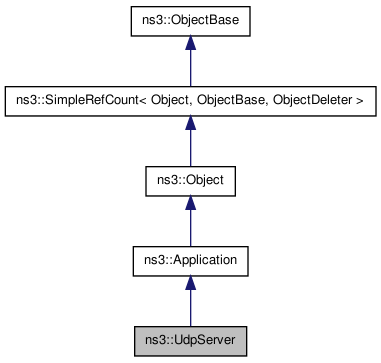A Udp server. Receives UDP packets from a remote host. UDP packets carry a 32bits sequence number followed by a 64bits time stamp in their payloads. The application uses, the sequence number to determine if a packet is lost, and the time stamp to compute the delay. More...
#include <udp-server.h>


Public Member Functions | |
| uint32_t | GetLost (void) const |
| uint32_t | GetReceived (void) const |
| returns the number of received packets | |
| uint16_t | GetPacketWindowSize () const |
| void | SetPacketWindowSize (uint16_t size) |
| Set the size of the window used for checking loss. This value should be a multiple of 8. | |
Static Public Member Functions | |
| static TypeId | GetTypeId (void) |
| This method returns the TypeId associated to ns3::UdpServer. | |
Protected Member Functions | |
| virtual void | DoDispose (void) |
Detailed Description
A Udp server. Receives UDP packets from a remote host. UDP packets carry a 32bits sequence number followed by a 64bits time stamp in their payloads. The application uses, the sequence number to determine if a packet is lost, and the time stamp to compute the delay.
Member Function Documentation
| virtual void ns3::UdpServer::DoDispose | ( | void | ) | [protected, virtual] |
This method is called by Object::Dispose or by the object's destructor, whichever comes first.
Subclasses are expected to implement their real destruction code in an overriden version of this method and chain up to their parent's implementation once they are done. i.e., for simplicity, the destructor of every subclass should be empty and its content should be moved to the associated DoDispose method.
It is safe to call GetObject from within this method.
Reimplemented from ns3::Application.
| uint32_t ns3::UdpServer::GetLost | ( | void | ) | const |
returns the number of lost packets
- Returns:
- the number of lost packets
| uint16_t ns3::UdpServer::GetPacketWindowSize | ( | ) | const |
- Returns:
- the size of the window used for checking loss.
| uint32_t ns3::UdpServer::GetReceived | ( | void | ) | const |
returns the number of received packets
- Returns:
- the number of received packets
| static TypeId ns3::UdpServer::GetTypeId | ( | void | ) | [static] |
This method returns the TypeId associated to ns3::UdpServer.
This object is accessible through the following paths with Config::Set and Config::Connect:
- /NodeList/[i]/ApplicationList/[i]/$ns3::UdpServer
- /NodeList/[i]/DeviceList/[i]/$ns3::AlohaNoackNetDevice/Phy/$ns3::Application/$ns3::UdpServer
- /NodeList/[i]/DeviceList/[i]/$ns3::AlohaNoackNetDevice/Phy/$ns3::UdpServer
- /NodeList/[i]/DeviceList/[i]/$ns3::BaseStationNetDevice/BsIpcsPacketClassifier/$ns3::Application/$ns3::UdpServer
- /NodeList/[i]/DeviceList/[i]/$ns3::BaseStationNetDevice/BsIpcsPacketClassifier/$ns3::UdpServer
- /NodeList/[i]/DeviceList/[i]/$ns3::BaseStationNetDevice/LinkManager/$ns3::Application/$ns3::UdpServer
- /NodeList/[i]/DeviceList/[i]/$ns3::BaseStationNetDevice/LinkManager/$ns3::UdpServer
- /NodeList/[i]/DeviceList/[i]/$ns3::BaseStationNetDevice/SSManager/$ns3::Application/$ns3::UdpServer
- /NodeList/[i]/DeviceList/[i]/$ns3::BaseStationNetDevice/SSManager/$ns3::UdpServer
- /NodeList/[i]/DeviceList/[i]/$ns3::BaseStationNetDevice/ServiceFlowManager/$ns3::Application/$ns3::UdpServer
- /NodeList/[i]/DeviceList/[i]/$ns3::BaseStationNetDevice/ServiceFlowManager/$ns3::UdpServer
- /NodeList/[i]/DeviceList/[i]/$ns3::NonCommunicatingNetDevice/Phy/$ns3::Application/$ns3::UdpServer
- /NodeList/[i]/DeviceList/[i]/$ns3::NonCommunicatingNetDevice/Phy/$ns3::UdpServer
- /NodeList/[i]/DeviceList/[i]/$ns3::SubscriberStationNetDevice/Classifier/$ns3::Application/$ns3::UdpServer
- /NodeList/[i]/DeviceList/[i]/$ns3::SubscriberStationNetDevice/Classifier/$ns3::UdpServer
- /NodeList/[i]/DeviceList/[i]/$ns3::SubscriberStationNetDevice/LinkManager/$ns3::Application/$ns3::UdpServer
- /NodeList/[i]/DeviceList/[i]/$ns3::SubscriberStationNetDevice/LinkManager/$ns3::UdpServer
- /NodeList/[i]/DeviceList/[i]/$ns3::SubscriberStationNetDevice/SSScheduler/$ns3::Application/$ns3::UdpServer
- /NodeList/[i]/DeviceList/[i]/$ns3::SubscriberStationNetDevice/SSScheduler/$ns3::UdpServer
- /NodeList/[i]/DeviceList/[i]/$ns3::UanNetDevice/Channel/NoiseModel/$ns3::Application/$ns3::UdpServer
- /NodeList/[i]/DeviceList/[i]/$ns3::UanNetDevice/Channel/NoiseModel/$ns3::UdpServer
- /NodeList/[i]/DeviceList/[i]/$ns3::UanNetDevice/Channel/PropagationModel/$ns3::Application/$ns3::UdpServer
- /NodeList/[i]/DeviceList/[i]/$ns3::UanNetDevice/Channel/PropagationModel/$ns3::UdpServer
- /NodeList/[i]/DeviceList/[i]/$ns3::UanNetDevice/Mac/$ns3::Application/$ns3::UdpServer
- /NodeList/[i]/DeviceList/[i]/$ns3::UanNetDevice/Mac/$ns3::UdpServer
- /NodeList/[i]/DeviceList/[i]/$ns3::UanNetDevice/Phy/$ns3::Application/$ns3::UdpServer
- /NodeList/[i]/DeviceList/[i]/$ns3::UanNetDevice/Phy/$ns3::UdpServer
- /NodeList/[i]/DeviceList/[i]/$ns3::UanNetDevice/Transducer/$ns3::Application/$ns3::UdpServer
- /NodeList/[i]/DeviceList/[i]/$ns3::UanNetDevice/Transducer/$ns3::UdpServer
- /NodeList/[i]/DeviceList/[i]/$ns3::WimaxNetDevice/$ns3::BaseStationNetDevice/BsIpcsPacketClassifier/$ns3::Application/$ns3::UdpServer
- /NodeList/[i]/DeviceList/[i]/$ns3::WimaxNetDevice/$ns3::BaseStationNetDevice/BsIpcsPacketClassifier/$ns3::UdpServer
- /NodeList/[i]/DeviceList/[i]/$ns3::WimaxNetDevice/$ns3::BaseStationNetDevice/LinkManager/$ns3::Application/$ns3::UdpServer
- /NodeList/[i]/DeviceList/[i]/$ns3::WimaxNetDevice/$ns3::BaseStationNetDevice/LinkManager/$ns3::UdpServer
- /NodeList/[i]/DeviceList/[i]/$ns3::WimaxNetDevice/$ns3::BaseStationNetDevice/SSManager/$ns3::Application/$ns3::UdpServer
- /NodeList/[i]/DeviceList/[i]/$ns3::WimaxNetDevice/$ns3::BaseStationNetDevice/SSManager/$ns3::UdpServer
- /NodeList/[i]/DeviceList/[i]/$ns3::WimaxNetDevice/$ns3::BaseStationNetDevice/ServiceFlowManager/$ns3::Application/$ns3::UdpServer
- /NodeList/[i]/DeviceList/[i]/$ns3::WimaxNetDevice/$ns3::BaseStationNetDevice/ServiceFlowManager/$ns3::UdpServer
- /NodeList/[i]/DeviceList/[i]/$ns3::WimaxNetDevice/$ns3::SubscriberStationNetDevice/Classifier/$ns3::Application/$ns3::UdpServer
- /NodeList/[i]/DeviceList/[i]/$ns3::WimaxNetDevice/$ns3::SubscriberStationNetDevice/Classifier/$ns3::UdpServer
- /NodeList/[i]/DeviceList/[i]/$ns3::WimaxNetDevice/$ns3::SubscriberStationNetDevice/LinkManager/$ns3::Application/$ns3::UdpServer
- /NodeList/[i]/DeviceList/[i]/$ns3::WimaxNetDevice/$ns3::SubscriberStationNetDevice/LinkManager/$ns3::UdpServer
- /NodeList/[i]/DeviceList/[i]/$ns3::WimaxNetDevice/$ns3::SubscriberStationNetDevice/SSScheduler/$ns3::Application/$ns3::UdpServer
- /NodeList/[i]/DeviceList/[i]/$ns3::WimaxNetDevice/$ns3::SubscriberStationNetDevice/SSScheduler/$ns3::UdpServer
- /NodeList/[i]/DeviceList/[i]/$ns3::WimaxNetDevice/BandwidthManager/$ns3::Application/$ns3::UdpServer
- /NodeList/[i]/DeviceList/[i]/$ns3::WimaxNetDevice/BandwidthManager/$ns3::UdpServer
- /NodeList/[i]/DeviceList/[i]/$ns3::WimaxNetDevice/BurstProfileManager/$ns3::Application/$ns3::UdpServer
- /NodeList/[i]/DeviceList/[i]/$ns3::WimaxNetDevice/BurstProfileManager/$ns3::UdpServer
- /NodeList/[i]/DeviceList/[i]/$ns3::WimaxNetDevice/Channel/$ns3::UanChannel/NoiseModel/$ns3::Application/$ns3::UdpServer
- /NodeList/[i]/DeviceList/[i]/$ns3::WimaxNetDevice/Channel/$ns3::UanChannel/NoiseModel/$ns3::UdpServer
- /NodeList/[i]/DeviceList/[i]/$ns3::WimaxNetDevice/Channel/$ns3::UanChannel/PropagationModel/$ns3::Application/$ns3::UdpServer
- /NodeList/[i]/DeviceList/[i]/$ns3::WimaxNetDevice/Channel/$ns3::UanChannel/PropagationModel/$ns3::UdpServer
- /NodeList/[i]/DeviceList/[i]/$ns3::WimaxNetDevice/ConnectionManager/$ns3::Application/$ns3::UdpServer
- /NodeList/[i]/DeviceList/[i]/$ns3::WimaxNetDevice/ConnectionManager/$ns3::UdpServer
- /NodeList/[i]/DeviceList/[i]/$ns3::WimaxNetDevice/Phy/Channel/$ns3::UanChannel/NoiseModel/$ns3::Application/$ns3::UdpServer
- /NodeList/[i]/DeviceList/[i]/$ns3::WimaxNetDevice/Phy/Channel/$ns3::UanChannel/NoiseModel/$ns3::UdpServer
- /NodeList/[i]/DeviceList/[i]/$ns3::WimaxNetDevice/Phy/Channel/$ns3::UanChannel/PropagationModel/$ns3::Application/$ns3::UdpServer
- /NodeList/[i]/DeviceList/[i]/$ns3::WimaxNetDevice/Phy/Channel/$ns3::UanChannel/PropagationModel/$ns3::UdpServer
Attributes defined for this type:
-
Port: Port on which we listen for incoming packets.
- Set with class: ns3::UintegerValue
- Underlying type: uint16_t 0:65535
- Initial value: 100
- Flags: construct write read
-
PacketWindowSize: The size of the window used to compute the packet loss. This value should be a multiple of 8.
- Set with class: ns3::UintegerValue
- Underlying type: uint16_t 8:256
- Initial value: 32
- Flags: construct write read
Attributes defined in parent class ns3::Application:
- StartTime: Time at which the application will start
- StopTime: Time at which the application will stop
No TraceSources defined for this type.
Reimplemented from ns3::Application.
| void ns3::UdpServer::SetPacketWindowSize | ( | uint16_t | size | ) |
Set the size of the window used for checking loss. This value should be a multiple of 8.
- Parameters:
-
size the size of the window used for checking loss. This value should be a multiple of 8
The documentation for this class was generated from the following files:
- src/applications/udp-client-server/udp-server.h
- doc/introspected-doxygen.h
 1.7.1
1.7.1